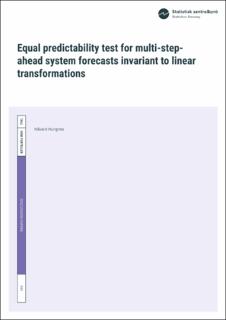Equal predictability test for multi-step-ahead system forecasts invariant to linear transformations
Working paper
Permanent lenke
https://hdl.handle.net/11250/2656482Utgivelsesdato
2020-05Metadata
Vis full innførselSamlinger
- Discussion Papers [1002]
Sammendrag
The paper derives a test for equal predictability of multi-step-ahead system forecasts that is invariant to linear transformations. The test is a multivariate version of the Diebold-Mariano test. An invariant metric for multi-step-ahead system forecasts is necessary as the conclusions otherwise can depend on how the forecasts are reported (e.g., as in levels or differences; or log-levels or growth rates). The test is used in comparing quarterly multi-step-ahead system forecasts made by Statistics Norway with similar forecasts made by Norges Bank.
Utgiver
Statistisk sentralbyråSerie
Discussion Paper;No. 931
Med mindre annet er angitt, så er denne innførselen lisensiert som Attribution-NonCommercial-NoDerivatives 4.0 Internasjonal
Beslektede innførsler
Viser innførsler beslektet ved tittel, forfatter og emneord.
-
Encompassing tests for evaluating multi-step system forecasts invariant to linear transformations
Hungnes, Håvard (Discussion Papers;No. 871, Working paper, 2018-02-12)The paper suggests two encompassing tests for evaluating multi-step system forecasts invariant to linear transformations. An invariant measure for forecast accuracy is necessary as the conclusions otherwise can depend ... -
Material accounting in a macroeconomic framework forecast of waste generated in manufacturing industries in Norway
Ibenholt, Karin (Discussion Papers;No. 236, Working paper, 1998)This paper analyses the generation of waste in production processes, based on the physical law of conservation of mass. By this law, mass going into a production process must equal the mass coming out of the same process. ... -
Empirical errors and predicted errors in fertility, mortality and migration forecasts in the European economic area
Keilman, Nico; Pham, Dinh Quang (Discussion Papers;No. 386, Working paper, 2004)Abstract: We analyse empirical errors observed in historical population forecasts produced by statistical agencies in 14 European countries since 1950. The focus is on forecasts for three demographic variables: fertility ...

